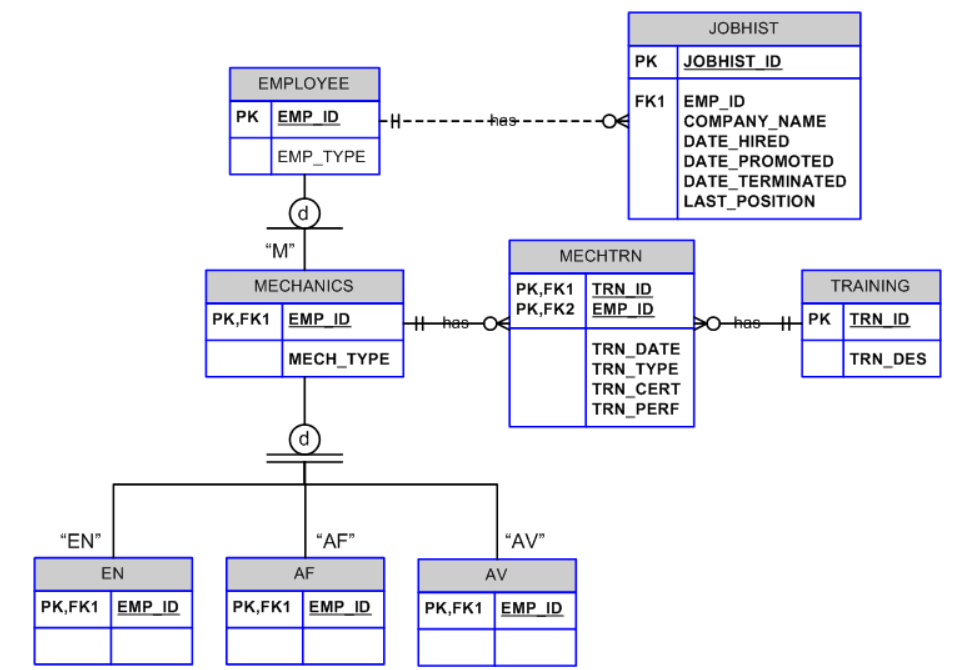Question
This segment of an ERD displays a specialization hierarchy with subtype/supertype relationships. Choose all business rules that are represented by this diagram. This problem is

This segment of an ERD displays a specialization hierarchy with subtype/supertype relationships. Choose all business rules that are represented by this diagram.
This problem is scored right minus wrong answers, so it is not a good idea to guess.
I have given you a hardcopy of this ERD also in case you might find that easier to read.
Question 37 options:
|
|
|
| a) | TRAINING is a subtype of MECHTRN. |
|
|
|
| b) | MECHTRN is a bridge table that was used to remove the many-to-many relationship between MECHANICS and TRAINING. |
|
|
|
| c) | All mechanics are specialized in avionics (AV) maintenance. |
|
|
|
| d) | Some mechanics can specialize in engine (EN) maintenance. |
|
|
|
| e) | Mechanics can only specialize in one area of maintenance. |
|
|
|
| f) | All mechanics are employees. |
|
|
|
| g) | DATE_HIRED is an attribute of MECHANICS. |
|
|
|
| h) | Some mechanics specialize in both EN and AF. |
|
|
|
| i) | MECHTRN has a strong relationship with TRAINING. |
|
|
|
| j) | All mechanics have to have at least one area of specialization. |
|
|
|
| k) | MECH_TYPE is the subtype discriminator for the MECHANICS to EN/AF/AV subtype relationship. |
|
|
|
| l) | There are 4 subtypes of MECHANICS. |
|
|
|
| m) | All employees are mechanics. |
|
|
|
| n) | Some mechanics can specialize in airframe (AF) maintenance. |
|
|
|
| o) | MECHANICS are not required to have MECHTRN (mechanical training). |
|
|
|
| p) | Some employees may just be regular employees rather than having to be mechanics. |
Question 38 (2 points)
Saved
Listen
Referring to the Employee database above, is the JOBHIST table a weak entity or a strong entity?
Question 38 options:
|
|
|
| a) | weak entity |
|
|
|
| b) | strong entity |
Question 39 (4 points)
Listen
Which of the following business rules are modeled in the Employee database for the relationship between the JOBHIST table and the EMPLOYEE table. CHOOSE ALL THAT APPLY.
Question 39 options:
|
|
|
| a) | Each employee can have zero or more job histories. |
|
|
|
| b) | Each job history belongs to one or more employees. |
|
|
|
| c) | Each job history belongs to exactly one employee. |
|
|
|
| d) | Each job history belongs to zero or one employee. |
|
|
|
| e) | Each employee must have 1 or more job histories. |
Question 40 (2 points)
Saved
Listen
In the employee database, if I change the design of the JOBHIST table to use a composite primary key of JOBHIST_ID + EMP_ID, how does that change the relationship between the JOBHIST table and the EMPLOYEE table?
Question 40 options:
|
|
|
| a) | Instead of a zero to many relationship, we will have a one to many relationship. |
|
|
|
| b) | The relationship does not change. |
|
|
|
| c) | The relationship between the tables becomes strong. |
|
|
|
| d) | The relationship between the tables becomes weak. |
Step by Step Solution
There are 3 Steps involved in it
Step: 1

Get Instant Access to Expert-Tailored Solutions
See step-by-step solutions with expert insights and AI powered tools for academic success
Step: 2

Step: 3

Ace Your Homework with AI
Get the answers you need in no time with our AI-driven, step-by-step assistance
Get Started


